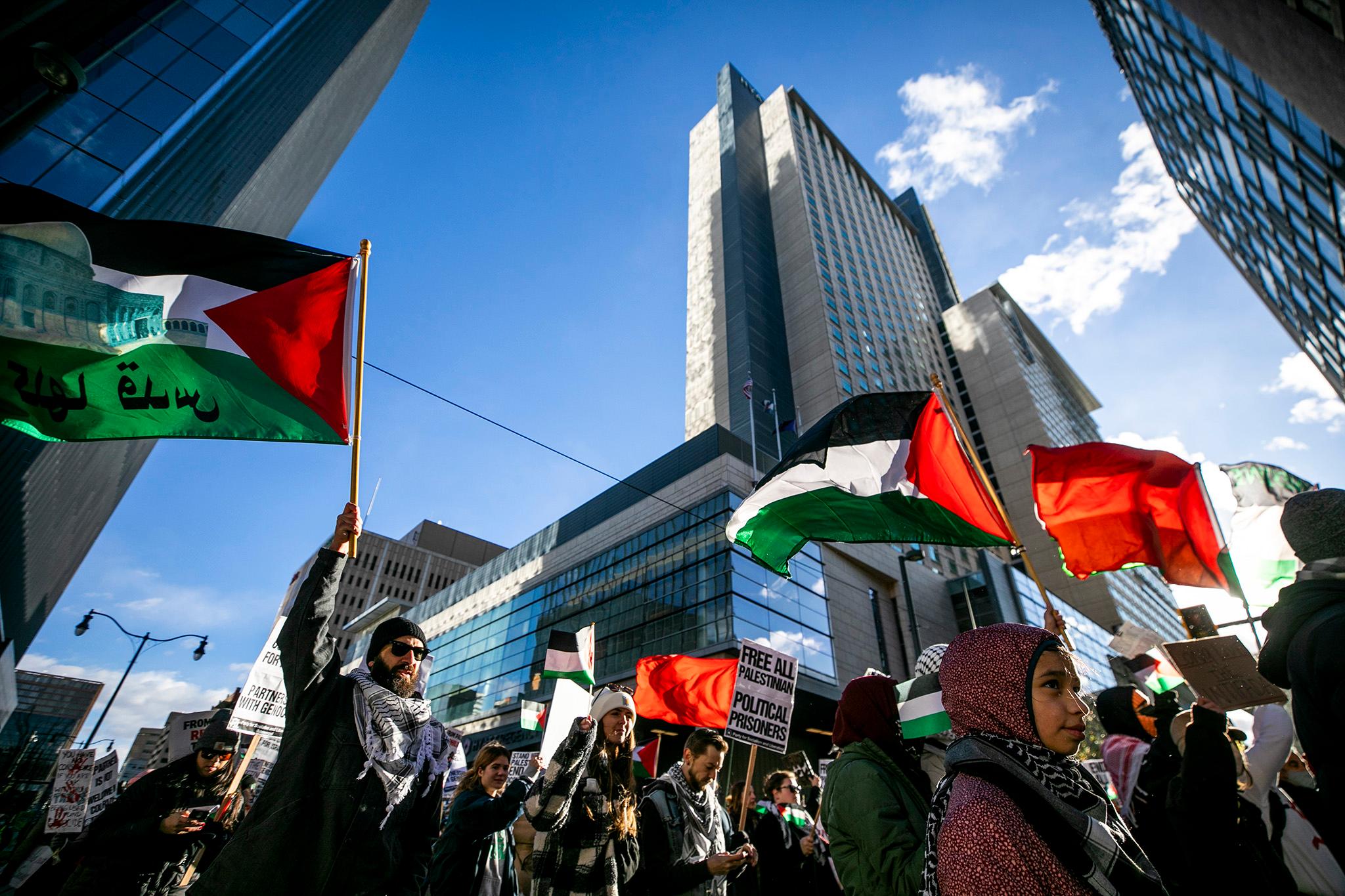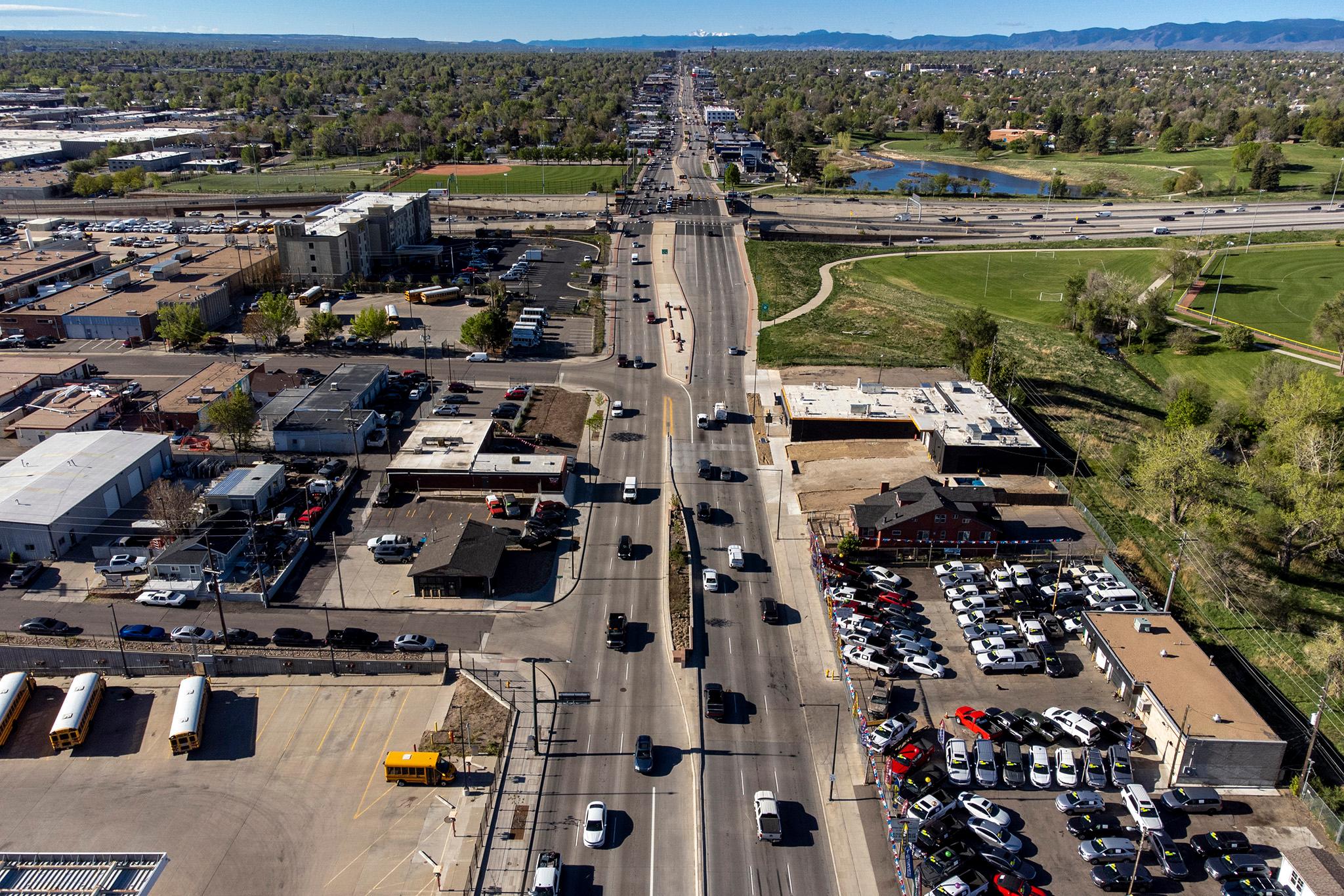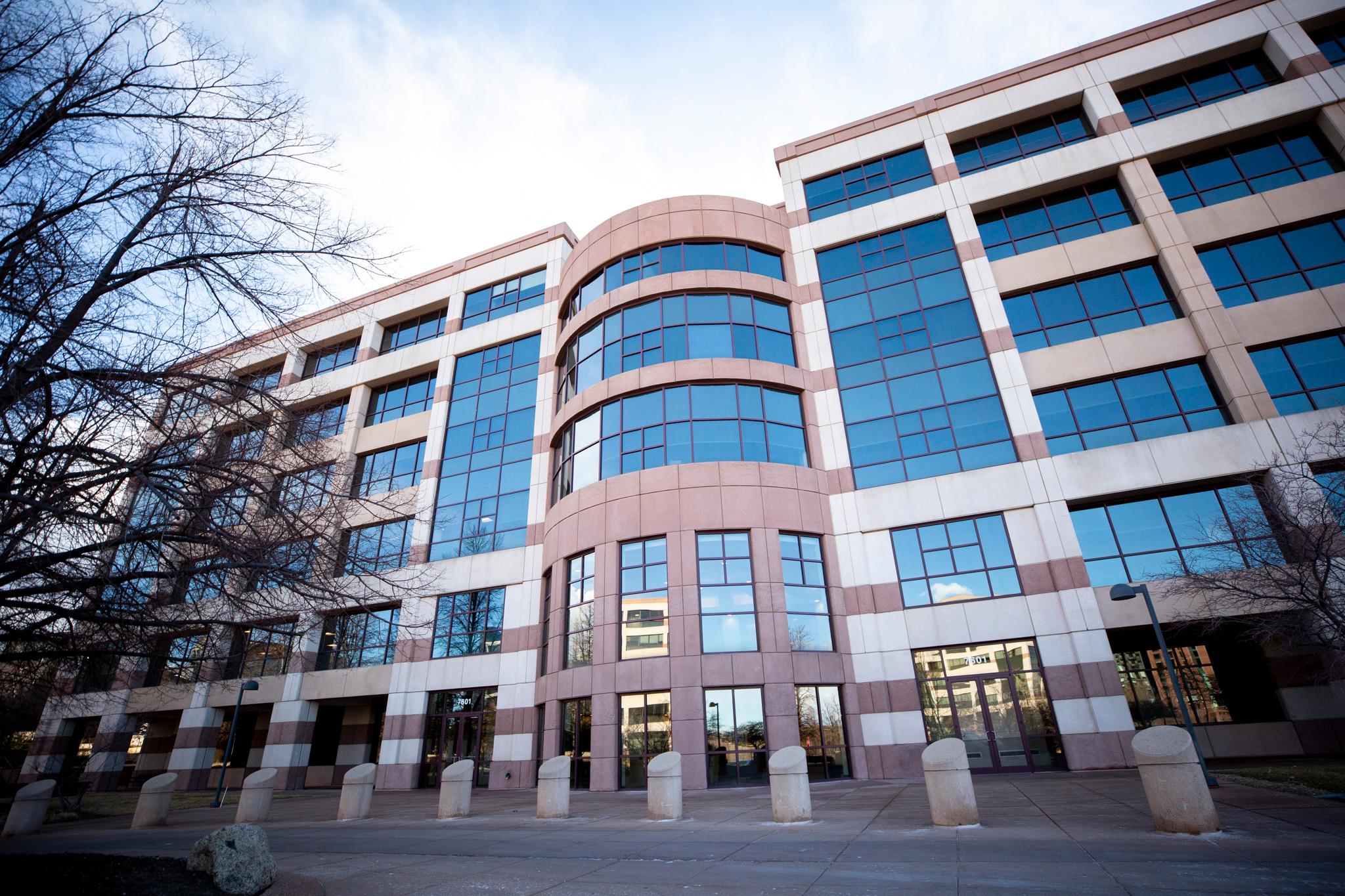For four days, chants against Zionism rang out through downtown Denver, as the Jewish National Fund USA's Global Conference for Israel met inside the Colorado Convention Center behind cement barricades and lines of police dressed in riot gear and holding rifles.
The unmet goal of the protests: "Shut it down."
The Israeli-Palestinian conflict has been going on since before Israel declared independence from British colonial rule in 1948 and pushed many Palestinians from their homes. Protests at the JNF-USA convention have been an annual tradition long before the Israel-Hamas war.
In Denver, both sides -- Zionists who have created the Jewish state of Israel and anti-Zionists who want the Jewish state out of the Middle East -- presented their largely incompatible visions of the future.
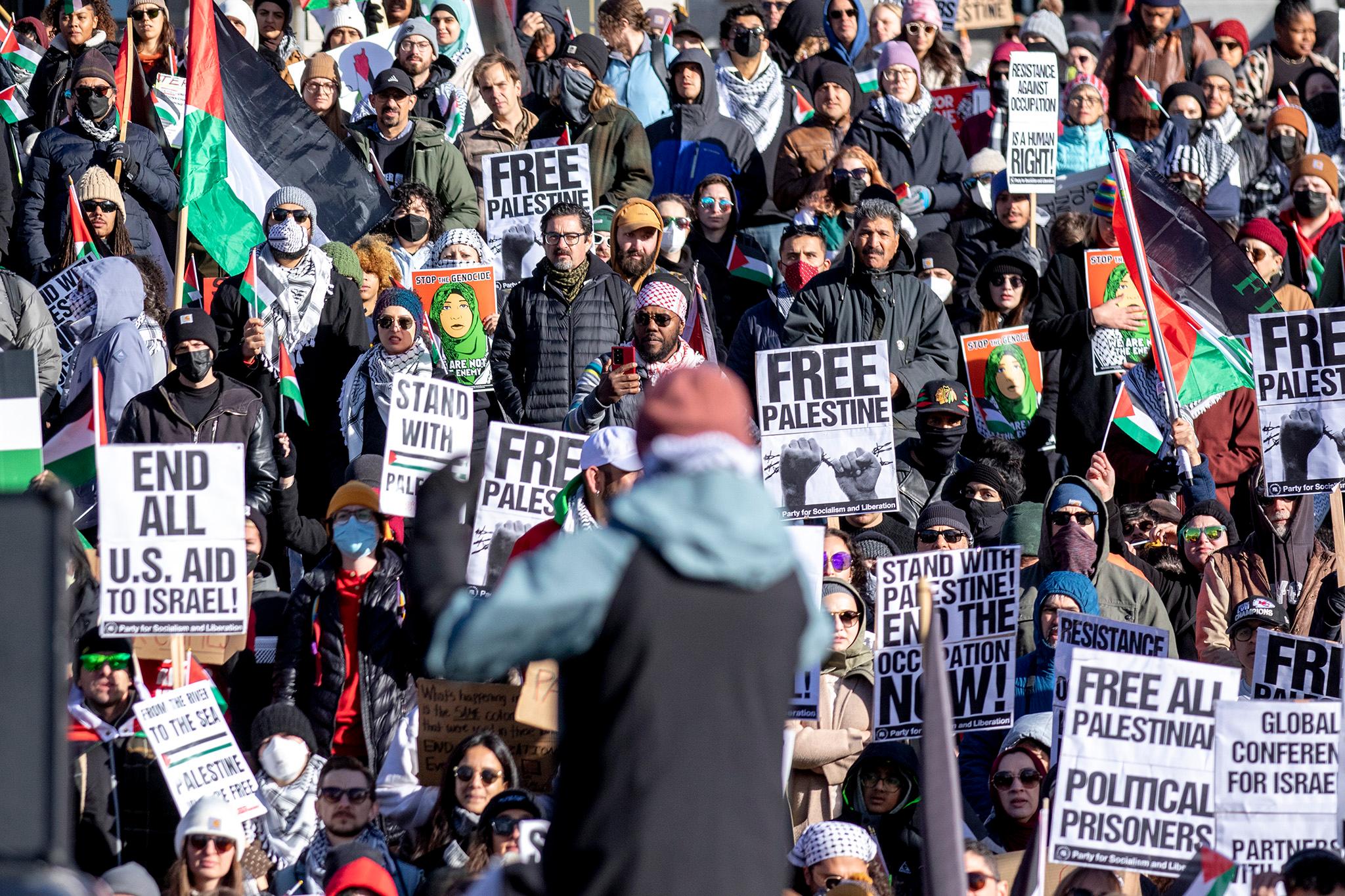
This year's demonstrations and conference attracted people from all over the country in addition to locals. Some have been organizing on their respective sides for decades.
The JNF dates back to 1901. The group was instrumental in the Jewish acquisition of land, which led to the creation of Israel in 1948.
This year's convention was overshadowed by the Israel-Hamas war that broke out on Oct. 7, the day Hamas militants attacked Israel, killing around 1,200 people and taking about 240 hostages, according to Israeli officials. Israel's retaliatory airstrikes have so far killed more than 15,000 Palestinians, and displaced 1.87 million, according to the United Nations Office for the Coordination of Humanitarian Affairs.
In Denver, both groups mourned their dead, mostly civilians. Both strategized for making their political cases for the undecided. Neither group appeared to speak with the other. Neither group appeared to listen to the other. Both expressed deep trauma, a fear of genocide and ongoing grief.
Nearly 7,000 miles away, as a largely peaceful though vitriolic ideological struggle played out in Colorado, a temporary ceasefire expired between Israel and Hamas and bombs and rockets began flying again, the killing resumed and negotiations for the release of hostages fell apart.
Inside the conference, participants discussed the rise in anti-semitism around the world, the pain caused by the killing of the 1,200-some people in Israel and how to build support for the war.
"I think most of us here are but one or two degrees of separation from somebody who's lost or kidnapped," said Gov. Jared Polis. "Perhaps these are personal friends of yours. There's a lot of pain. It's made worse by the fact that we're seeing the rise of antisemitism and hate in America and across the world."
Attacks on the Jewish community are the very reason Israel was created, he said. "If anyone asks why the world needs a Jewish State of Israel, the evidence is now more self-evident than ever before."
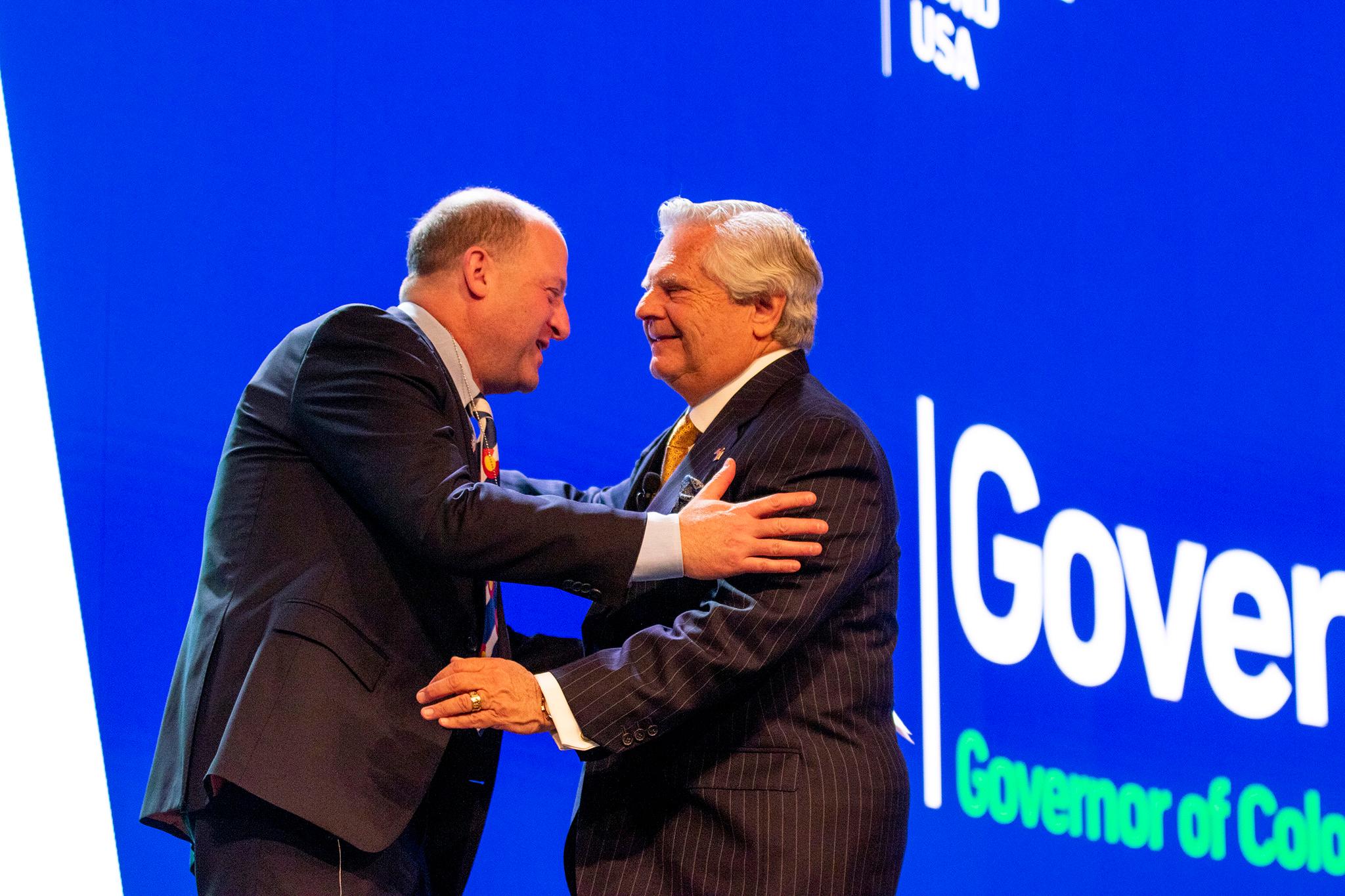
Sam Goldberg, the president of the Jewish National Fund USA's Mountain States Region, praised the audience as "the best of American Zionists."
"In this great test of our generation, we shall defeat the evil facing us," he said. "After all, defeating evil is the specialty of the Jewish heart. The era of the cowering Jew is over. The Jewish people of today stand strong and stand united. We are winners, and we will win, because that is what winners do."
Ron Werner, who owns several furniture stores in the metro area, attended the JNF- USA conference this year as he has the past decade. The gathering, he said, is a place for shared mourning and community and feels like a family.
As he thinks of the demonstrators outside, he wishes they could have a conversation instead of a screaming match.
"We'd love to be able to break bread together," he said. "We need to learn about each other and from each other. Screaming at each other doesn't solve the problem. People want to raise healthy children. They want them to have prosperous lives. They want them to be happy. That's universal. That's what we need to work on."
Protests echoed through downtown all weekend long near where the conference met.
After protesting the Global Conference for Israel's opening night plenary, anti-Zionist activists stood outside the convention center at an interfaith picket on Friday.
On Saturday, hundreds of demonstrators met at the Colorado State Capitol and took to the streets to march on the convention center. One of those people was Abdullah Elagha. Most of his family still lives in Gaza, and he has been demonstrating since Israel began to bomb civilians in the wake of the Hamas attack.
"It's horrible," Elagha said at the demonstration. "Every day is worse than the last."
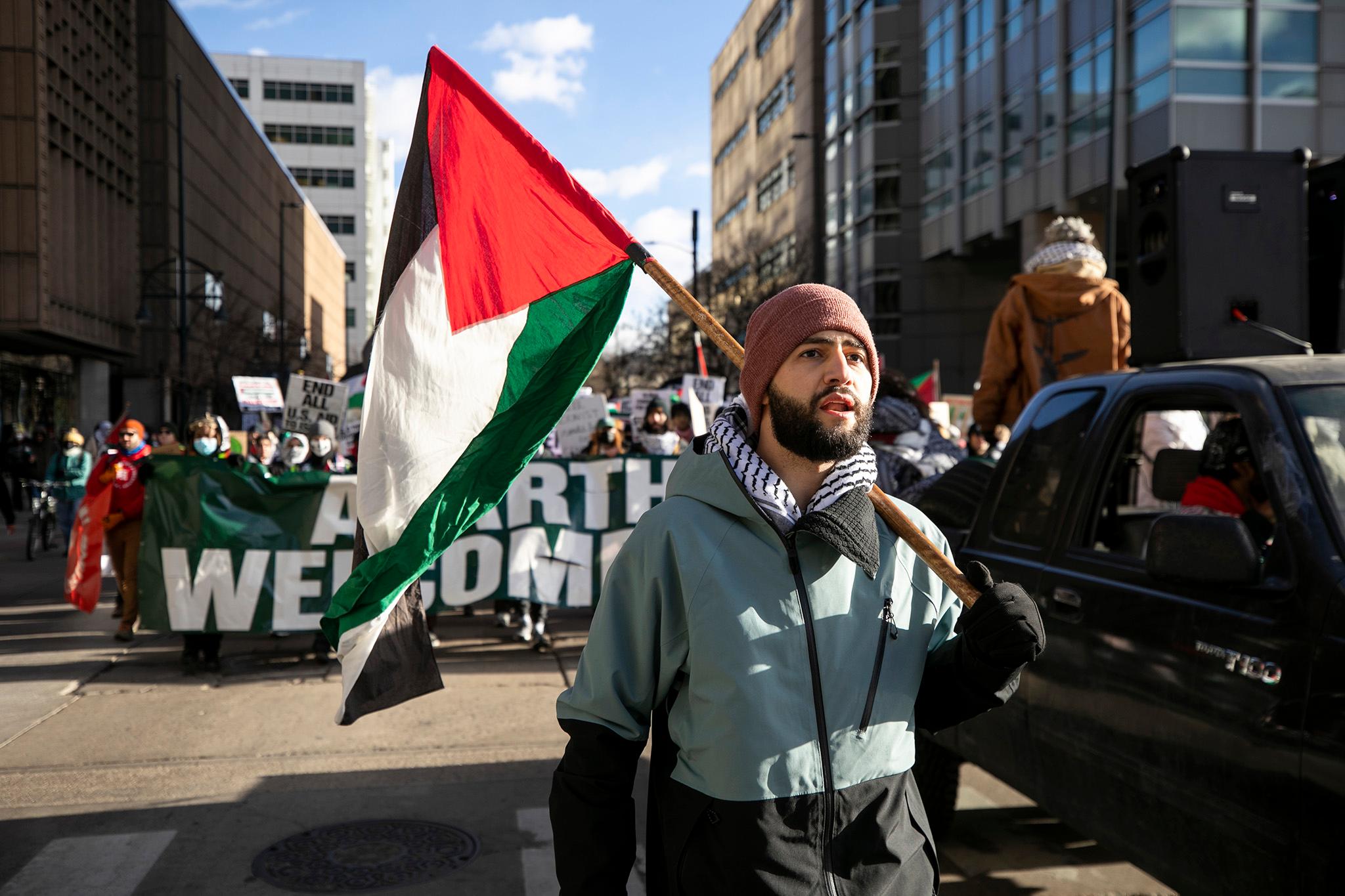
Nearly two months into the bombings, calls to his family members, who fear imminent death and are in a state of grief and terror, feel futile.
"What do I have left to say? You know, 'How are you guys doing?'" he said. "It's the stupidest question I've ever asked in my life."
During the temporary ceasefire in the war, aid and fuel were supposed to be delivered to Gaza, but his family reports little has made it to them.
Now, the bombing has resumed. The hope of more help coming has been largely dashed, he said.
"I'm having a hard time imagining it getting worse," he said. "But I think it's clear that it is only going to get worse. It doesn't seem like it's going to get better anytime soon."
On the last day of the conference, protesters snarled the streets in an attempt to block traffic, and 15 were arrested.
On Sunday, two separate groups of protesters met at the Auraria campus. The first saw a parade of cars decorated with Palestinian flags and painted messages drive through downtown to raise awareness. Some trucks carried people in the flatbed who led chants with megaphones.
"We're going to drive through downtown to get the message out that Denver doesn't stand with apartheid. Apartheid is not welcome here," Nate Kassa, an organizer with the Party for Socialism and Liberation, said before the rally.
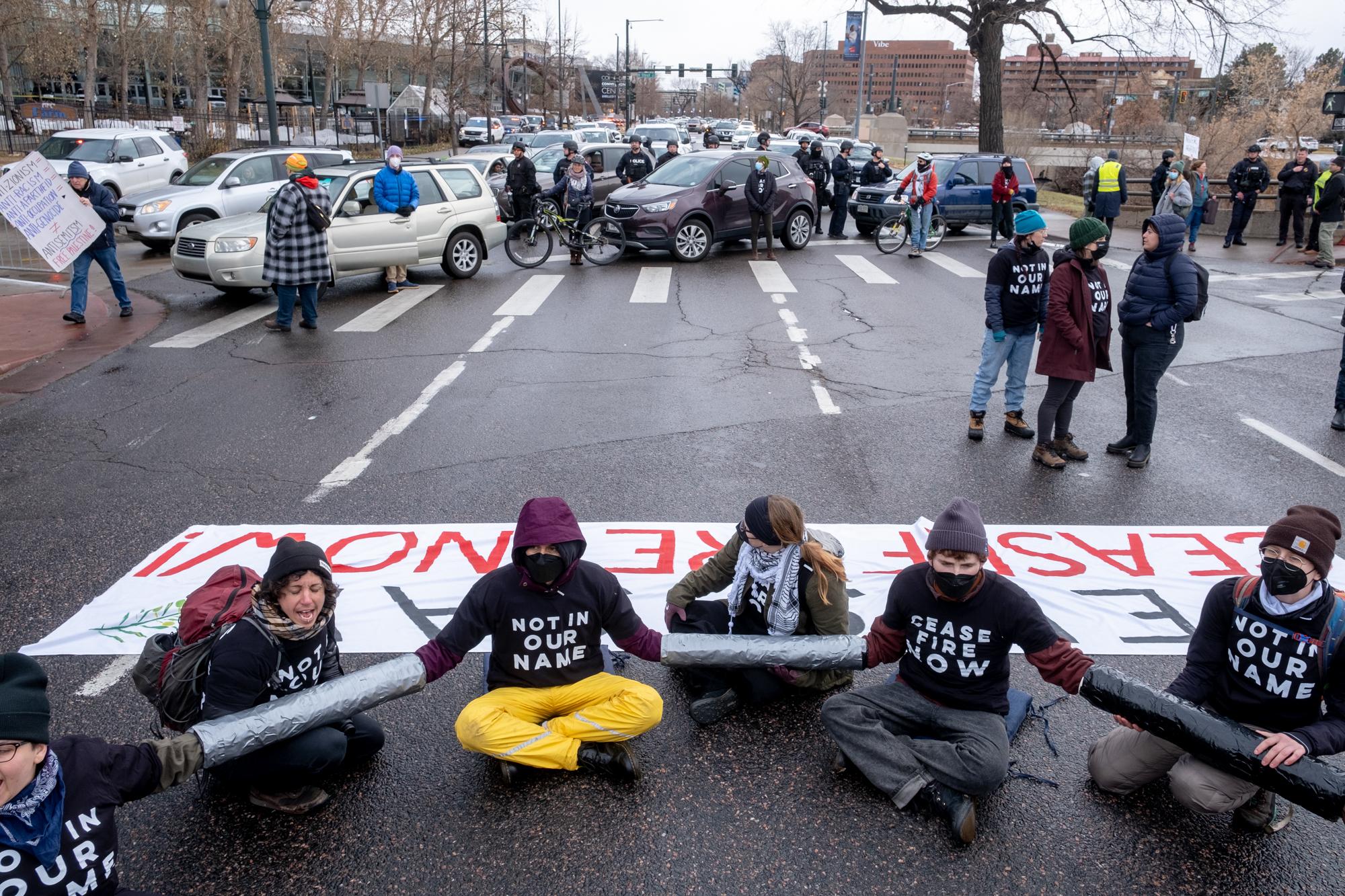
Amnesty International, Human Rights Watch and B'Tselem, the Israeli Information Center for Human Rights in the Occupied Territories have all described racial discrimination in the State of Israel as "apartheid," a charge the Israeli government strongly denies.
Even as snow and frigid temperatures impacted Denver Sunday morning, dozens of cars showed up at an Auraria parking lot to prepare. Participating was first-generation Palestinian-American Tay Musleh, who was preparing a large, blue pick-up truck while clinging onto a Palestine flag.
Musleh came with his mom and sister, who together have been protesting and trying to raise awareness about the experiences of Palestinians in Gaza for as long as he can remember. As the conflict has intensified in recent weeks, it's been harder to stay in contact with family there.
"Normally we would send hundreds of dollars every month," he said. "We can't send anything now. We can't support them at all."
The second protest that started at Auraria was organized by Jewish Voice for Peace. The group came to practice "b'tzelem elohim," a Jewish tradition that teaches every person is equally valued.
Allie Cannington, one of the speakers at the protest, said she wanted to show solidarity with Palestinians and to push back against ideas she learned in Jewish day school.
"As someone who grew up in Jewish day school, really being told this lie about Israel, that it is the ultimate beacon of safety for Jewish people," Cannington said. "And the reality is no safety for Jewish people can come at the cost of Palestinian life, Palestinian freedom, Palestinian land."
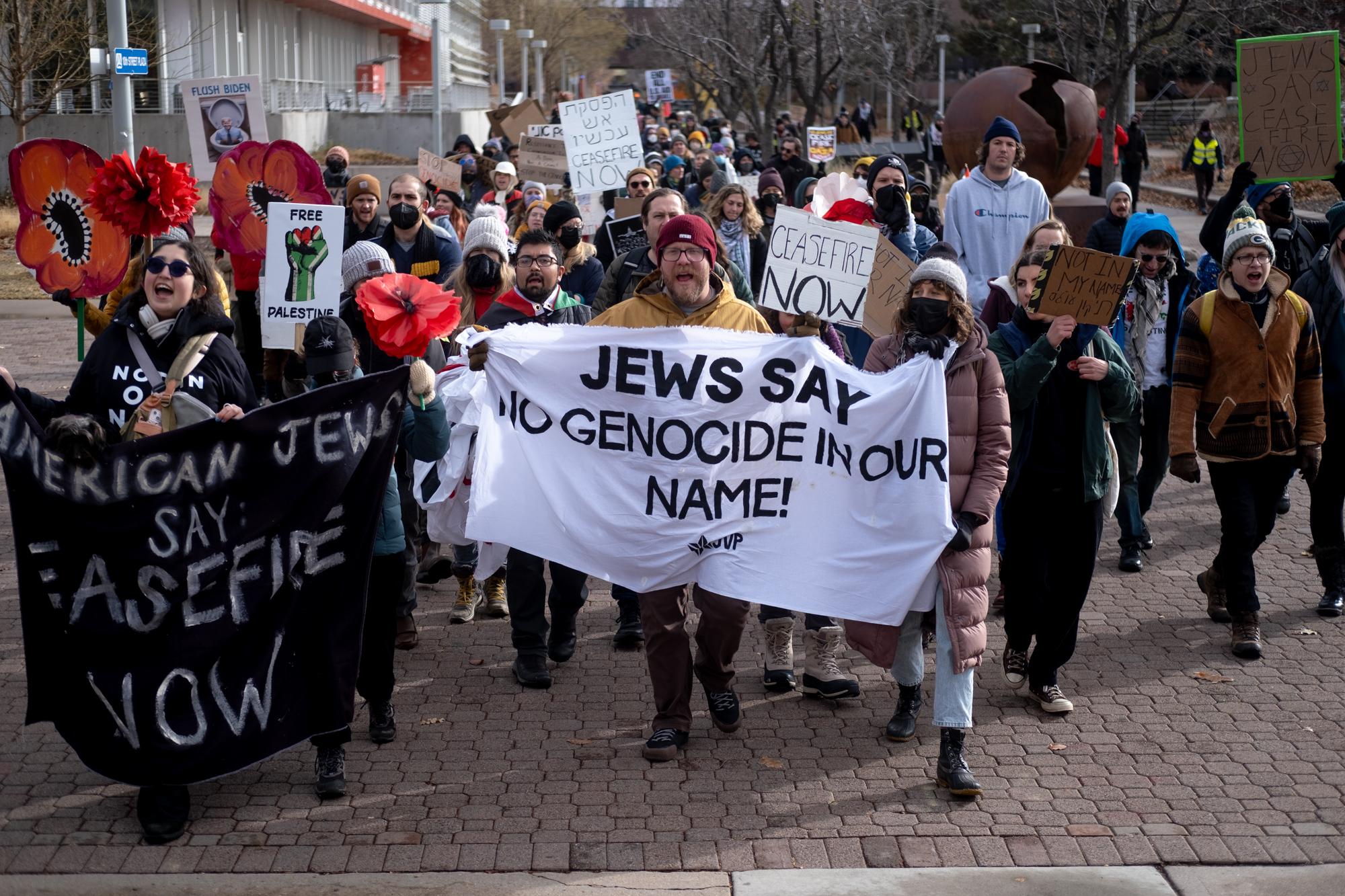
Some members of the protest blocked traffic right outside the Colorado Convention Center parking lot on Speer Boulevard and Champa Street in an attempt to disrupt the JNF-USA conference. A group either attached themselves to a car in the middle of the intersection, or interlinked with others using duct-taped tubes reinforced with metal wirings to form a circle.
Even as cars stuck in the traffic honked, either in support of the protest or frustration, protesters surrounded the circle to pray and chant.
Ellory Boyd, one of those in the circle, said she wasn't going to move unless she was forced to.
"Because we say never again means never again for anyone and the occupation and the genocide," Boyd said.
Eventually, Boyd and 14 others were forced to move by Denver police, who arrested them on grounds of obstruction of a street, failure to obey police orders, and use of prohibited obstruction equipment.
Now that the conference and protests are over, both sides plan to continue their advocacy.
This week, Jewish Colorado is working with the Jewish Federations of North America on a four-day National Mobilization to contact lawmakers' offices with pleas to support Israel.
"The purpose is to flood their lines with pro-Israel calls during this four-day period and ensure that they are not just hearing from anti-Israel constituencies (which, as we understand, they currently are in droves)," according to a statement from the group. "We need to urge Members of Congress to ignore calls from pro-Palestinian activists to restrict or even stop the flow of American aid to Israel."
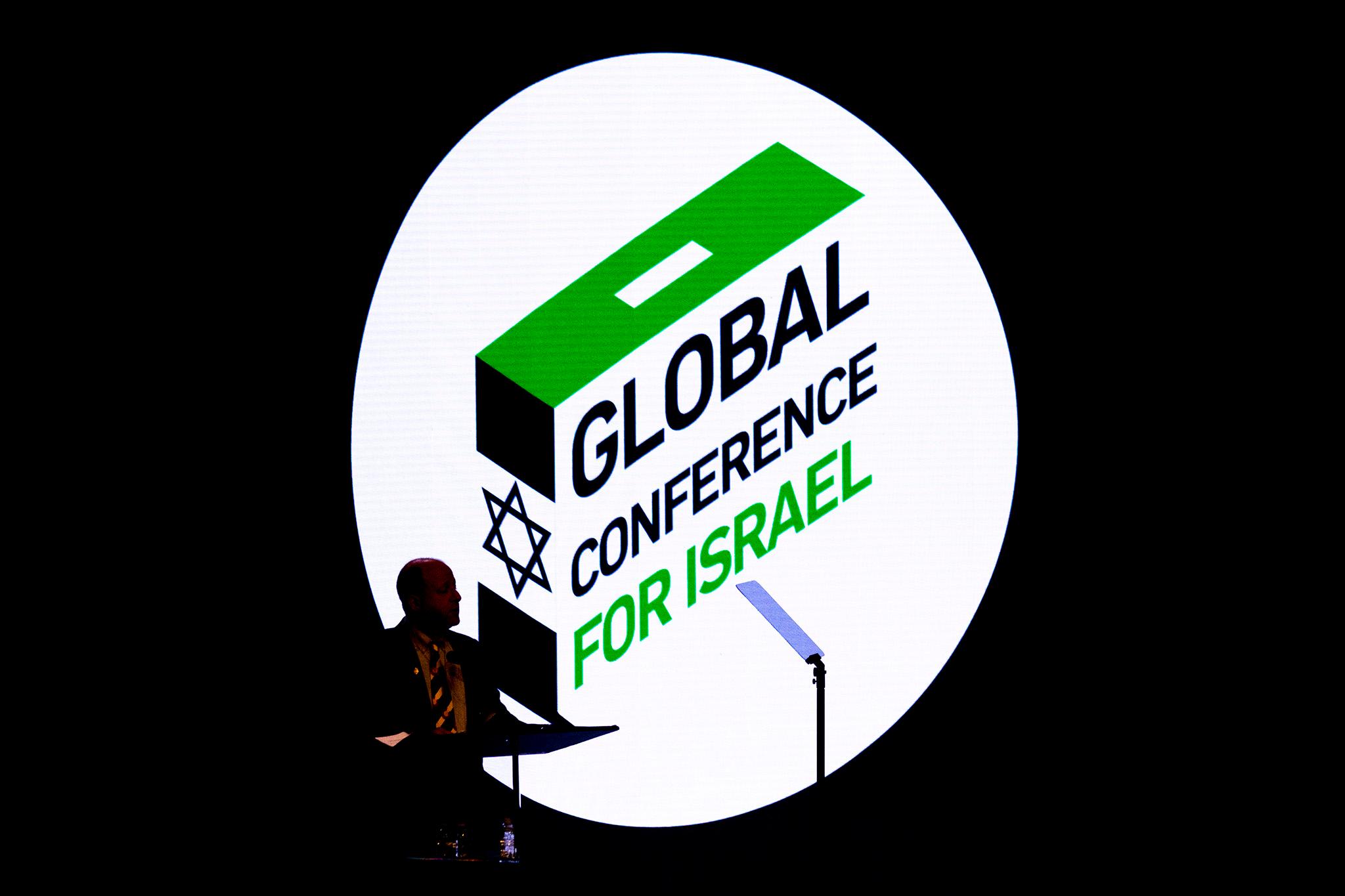
Meanwhile, Jewish Voice for Peace plans to continue to push lawmakers to support a ceasefire and quit funding Israel's government. The organization has participated in sit-ins in U.S. Rep. Diana DeGette's office, along with marches and protests, and plans to continue to do similar actions.
The coalition of local groups advocating for Palestinians will also continue holding regular protests and push for a ceasefire and an end to the Jewish state of Israel and for a Palestine that is welcoming to all: Jews, Muslims, Christians, secular people and beyond.
"We'll be out here," Elagha said. "We're going to continue advocating for Palestine. This is a movement that has been going for 75 years. It's grown sometimes. It's shrunk sometimes. The movement has been strong, and is only getting stronger."
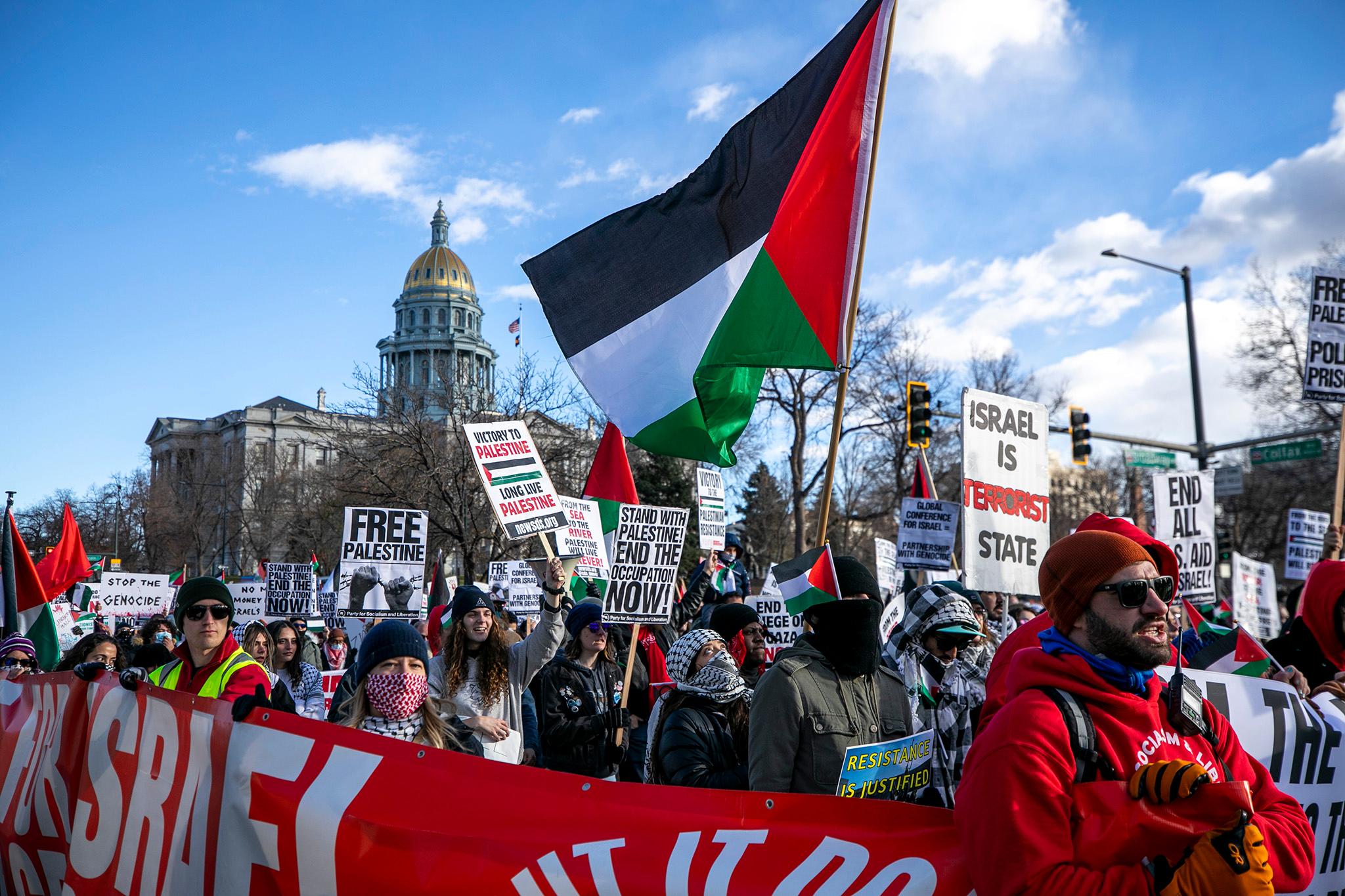
CPR News reporter Matt Bloom contributed reporting.
